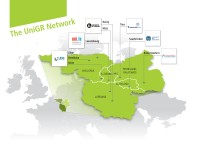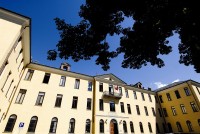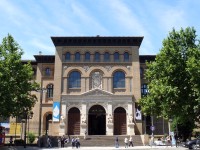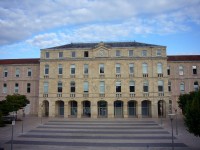Partners
The ECBS project includes nine partners: Université de Pau et des Pays de l'Adour (as coordinator), Université Savoie Mont Blanc, Université de la Grande Région/Universität der Grossregion, Università della Valle d'Aosta/Université de la Vallée d'Aoste, Universidad del País Vasco/Euskal Herriko Unibertsitatea, Universidad de Zaragoza, Universität des Saarlandes, Eucor-The European Campus, Prof en Poche and is supported by one more associated partner: ComUE d'Aquitaine.
FULL PARTNERS
|
UNIVERSITÉ DE PAU ET DES PAYS DE L'ADOUR - UPPA | |
|
The Université de Pau et des Pays de l'Adour (UPPA) is a public multidisciplinary university located in the south-west of France near Spain. It is a multi-sites university, with five campuses located in the cities of Pau, Bayonne, Anglet, Tarbes and Mont de Marsan. The UPPA offers training in initial, continuing, alternating or apprenticeship training, and is preparing for Bachelor degrees, Master degrees in its three colleges (College STEE - Sciences and Technologies for Energy and Environment; College EEI – European and International Studies; College SSH - Social Sciences and Humanities) and PhD degrees in its two doctoral schools. The UPPA also has two University Institutes of Technology (IUT) and two engineering schools (ENSGTI and ISABTP) in its College STEE and a management school (IAE) in its College EEI. In 2017, the UPPA had 12,675 students, 1,771 foreign students, 780 teaching staff, 573 administrative staff and 21 research units. In 2017, the UPPA obtained the I-SITE label of excellence (Initiatives - Scientific Innovation, Territories, Economy) for the "E2S - Energy and Environment Solutions" project in consortium with the INRA and the INRIA: https://e2s-uppa.eu/en/index.html .
| 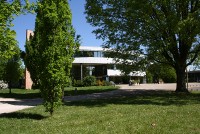 |
|
UNIVERSITÉ SAVOIE MONT BLANC - USMB | |
|
|
Located in the foothills of the Alps, the Université Savoie Mont Blanc (USMB) is a public higher education institution offering programmes of study at the bachelor, master and doctorate levels as well as continuing education opportunities. Its 15,000 students pursue studies in a variety of disciplines including engineering, humanities and social sciences, law, economics and management, mountain studies, and education. The excellence of these programmes is supported by 1200 teaching and administratif staff and the university's 19 research institutes. International relations are at the heart of higher education at the USMB, regularly ranked among the top universities in France for Erasmus mobility. The USMB maintains strong relationships with partners across 5 continents including cross-border collaborations in Italy and Switzerland.
|
|
UNIVERSITÉ DE LA GRANDE RÉGION/UNIVERSITÄT DER GROSSREGION - UNIGR | |
|
- 6 universities - 4 countries - 3 teaching languages (French, German, English) - More than 135,000 students - Near 7,000 PhD candidates - More than 10,000 lecturers and researchers
The establishment of the European Union and the elimination of borders have provided cross-border regions with outstanding opportunities for development through cooperation. The University of the Greater Region (UniGR) is a unique, innovative European confederation of six universities (the Technische Universität Kaiserslautern, the University of Liège, the University of Lorraine, the University of Luxembourg, Saarland University and Trier University) which are located on the cross-border area of the Greater Region (Germany – Rhineland-Palatinate and Saarland; Belgium – Wallonia, French and German communities of Belgium; France – Grand-Est Region (Lorraine), Grand Duchy of Luxembourg). The UniGR aims is to become a reference in Europe and across the world by actively working towards the development of a shared area for higher education and research in the Greater Region.
The UniGR was funded by the European Union as part of the Interreg IV A Greater Region programme. The project “University of the Greater Region-UniGR” was approved in September 2008, started on 15th October 2008 and finished in spring 2013. Since the completion of the project phase, the UniGR continues all these activities as a cross-border academic confederation, with its own legal form since 2015.
| |
|
UNIVERSITÀ DELLA VALLE D'AOSTA/UNIVERSITÉ DE LA VALLÉE D'AOSTE - UNIVDA | |
|
Founded in 2000, the Università della Valle d’Aosta (UNIVDA) is a newcomer among institutions of higher education. Its student body now numbers around 1200. Located in Aosta, a charming small town in the Northern Alps, the University’s beautiful surroundings offer a favourable environment for study and leisure. It is a hub for education and research with an eye to Europe and constant focus on the local territory. Its two Departments (Economics and Political Science and Human and Social Sciences) promote and coordinate research and teaching activities. The UNIVDA puts a great emphasis on expanding networks of relationships with qualified partners at a local, national and international level, which translates into numerous opportunities for student exchanges, academic collaborations and international research projects. For the fourth consecutive year, the University ranks second-best for its internationalisation policy and quality services among small non-State universities in the Censis ranking of Italian Universities.
| |
|
UNIVERSIDAD DEL PAÍS VASCO/EUSKAL HERRIKO UNIBERTSITATEA - UPV/EHU | |
|
The Universidad del País Vasco-Euskal Herriko Unibertsitatea (UPV/EHU) is a teaching and research institution officially founded in 1985. The university employs over 7,000 people in 31 faculties and schools distributed in three different campuses, with a total of more than 50,000 undergraduate and postgraduate students. The UPV/EHU offers the highest number of doctorate programmes of all Spanish universities, one third of which have received a mention of excellence from the Spanish Ministry of Education. The Spanish Ministry of Science and Innovation has recognised the UPV/EHU as an International Research Campus of Excellence.
| |
|
UNIVERSIDAD DE ZARAGOZA - UNIZAR | |
|
|
The University of Zaragoza (UNIZAR) is a public teaching and research institution which combines almost five centuries of history (since 1542) with a constantly updated range of courses. The UNIZAR has more than 30,000 students; 5,100 teaching and research staff and over 1,800 administration and service staff.
It offers courses in all areas: Arts and Humanities, Engineering and Architecture, Experimental Sciences, Health Sciences, Social Sciences and Law. Students can choose between 54 Bachelor’s degrees and, in terms of graduate studies, 55 master degrees and 45 doctoral programmes, in addition to 90 specific courses (postgraduate degrees and specialist diplomas) corresponding to UNIZAR lifelong learning strategy.
The UNIZAR is now among the top 2% of the most prestigious universities worldwide and one of the 10 best out of the 77 throughout Spain, standing out especially in computer science, in chemistry (the first in Spain) and in sports science (also the first in Spain).
The UNIZAR's international commitment is based on mobility programmes for students and personnel, double-degree programmes, agreements, research projects and worldwide university cooperation projects for development. Over 1,000 of our students participate in exchange programmes annually and we welcome around 1,000 international exchange students every year. Around 120 members of our staff go on educational visits to other countries every year.
|
|
UNIVERSITÄT DES SAARLANDES - USAAR | |
|
Transcending boundaries is a hallmark of Universität des Saarlandes (USAAR) – no matter whether these are geographical borders, cultural boundaries, barriers between academic disciplines, or outmoded divisions between academia and economic and cultural life. USAAR at a glance: - An international environment: 19 % international students and 22 % international scientific staff, more than 20 double degrees with international partner universities; - Particular expertise in the university’s specialist fields of Europe, IT, and NanoBioMed – Life and Matter; - A campus university with interdisciplinary networking possibilities, good support and small study groups; - Comprehensive preparation for entering a career or launching a start-up; - A strong research background; - Proximity to France and Luxembourg: mobility and intercultural exchanges are a daily experience.
| |
|
EUCOR-LE CAMPUS EUROPÉEN - EUCOR | |
|
Eucor-The European Campus (EUCOR) is a trinational alliance of five universities in the Upper Rhine, a border region between Germany, France and Switzerland. Its members are the universities of Basel, Freiburg, Haute-Alsace, Strasbourg, and the Karlsruhe Institute of Technology (KIT). Together, these institutions crystallise the skills of some 15,000 researchers, 11,000 doctoral candidates and 115,000 students. Their aim is to build a scientific space with a clearly defined profile, without walls or borders and with international outreach. In 2015, the five universities created a dedicated legal entity in the form of a European Grouping of Territorial Cooperation (EGTC), solidifying a cooperation that dates back to 1989. In this context, the universities retain their autonomy, but can act together in a more targeted way under the name EUCOR. As the first EGTC carried exclusively by universities, EUCOR is a model project, unique in the European research area.
| |
|
PROF EN POCHE - PeP | |
|
At Prof en Poche (PeP), we strongly believe that all students can achieve their full potential through a learning experience they can actually enjoy. Therefore we have developed AI-empowered tutoring solutions which make the learning process more engaging, personalized and fun. Our platform, where our students are learning by talking to the virtual tutor, on a writing or speaking form, is available 24/7 and can be fully customized to fit every learner’s needs. For the past 3 years, more than 200.000 students have been using our services. We are a team of 13 talented individuals who have the common passions for the share of knowledge and the learning process. By the end of 2020, we aim to hire 7 more people and generate $1,3 million in sales ($500,000 in 2019). In October 2019, we launched Mathia, which won the first public contract in artificial intelligence of the French Ministry of Education. With Mathia, our mission is to enable any kid to love and enjoy mathematics, a topic they often find too abstract and conceptual. With its unique combination of a voice assistant and a 3D visualization tool, it can be used in and out the classrooms, or at home. By 2021, Mathia could reach the hands of 135,000 teachers and 2 millions kids in France. Next year, we are also planning on translating Mathia for the English-speaking markets, using a different branding.
|
|
ASSOCIATED PARTNER
|
COMUE D'AQUITAINE | |
|
The Communauté d’Universités et Établissements d’Aquitaine (ComUE) is an association of universities and higher education institutions in the Aquitaine region in France. The ComUE brings together the main universities and higher education institutions of the regional territory around a common territorial strategy.
The ComUE has two main ambitions in order to coordinate and develop shared projects: - To bring to a higher level of scientific, educational, technical and economic efficiency, the services provided by the higher education of the region to the community and to the ecosystem in which they are operating. - In a perspective of territorial equity considerations, to improve the conditions of success and social advancement of students, to raise their cultural level and to enhance their access to jobs and responsibilities throughout life.
The members of the ComUE are:
| |












